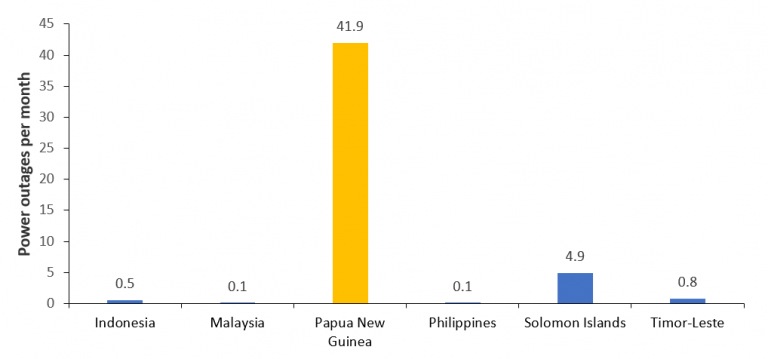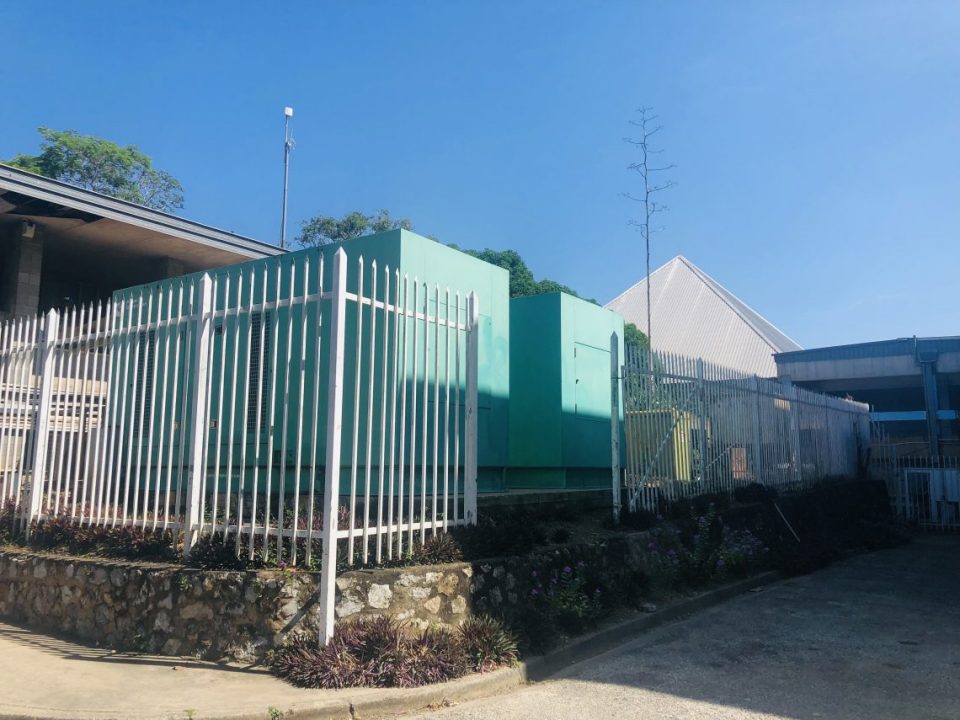by Michael Kabuni, Kingtau Mambon, Stephen Howes
The recent spate of power outages (70 in a week according to the Post Courier), and the sudden resignation of yet another PNG Power Chief Executive Officer after only nine months in the job have brought into stark relief the chronic crisis that afflicts Papua New Guinea’s power sector.
The electricity sector in PNG is characterised by very low access and unreliable and expensive service.
PNG is one of the least electrified countries in the world, with only 13% of the population having access to electricity (though this doesn’t include the much higher numbers who have bought themselves a solar panel for lighting). Electricity via a grid is limited to urban centres, and is unreliable. World Bank data for 2015 shows that PNG experienced an average of more than 40 blackouts per month that year, the third-highest in the world.

Long-distance transmission of power is currently limited to Port Moresby, Ramu (in Morobe and Madang), and Gazelle grids. These serve PNG’s main urban centres, while 19 isolated independent power grids serve provincial centres, relying on high-cost diesel generation. Between 2010 and 2015, average residential electricity prices in PNG were approximately US 39 cents per kWh, among the highest in the world.
Despite high tariffs, lack of funding is a key problem and arises from at least two sources: government payments owed to PNG Power Limited (PPL), and high levels of electricity theft. One estimate puts the debts from the government to PPL at K460 million (about US$130 million). Illegal connections by households that do not pay for electricity cost the utility K25 million (about US$7 million) per month.
Funding shortfalls mean PPL struggles to pay private electricity providers and to upgrade its aging infrastructure. In 2020, PASCOE International Power Ltd cut electricity to Lae due to PPL’s failure to settle a K60 million debt.
But PNG’s power sector problems run deeper than funding shortfalls and the country’s difficult topography. A recent academic article has argued that the underlying problem is a crisis of governance, and a failure to establish strong electricity institutions.
This crisis of governance has been made manifest by the revolving-door nature of PPL’s CEO position in recent years. Carolyn Blacklock was appointed to the top position in 2018 but resigned 20 months later. She cited government debts owed to PPL, but also the bullying tactics she faced from Chief Secretary of Government Isaac Lupari who, she claimed, undermined her dealings over the proposed Dirio power station. Lupari, on the other hand, accused Blacklock of involving herself in corporate and local politics and undermining established procedures.
Douglas Mageo was then made acting CEO until Flagon Bekker was appointed in late 2020. On 24 June 2021, the PPL union (which had opposed Bekker’s appointment from the start) called for the CEO’s resignation, claiming the restructuring he was pushing would affect their jobs. Three days later, Bekker resigned. Just two months earlier, at the end of March, he had unveiled his four-year reform plan.
Clearly, both political interference and opposition from PPL unions have undermined the prospects for power sector reform and improved performance.
It is not just the CEO’s position that is vulnerable. PPL Chair Peter Nupiri was dumped in January this year after less than three years in that role. His farewell comments noted PPL’s “militant union”, the slowdown in reform after Blacklock’s departure, and the destabilising impact of political interference.
In the meantime, a lack of affordable, reliable power is hurting PNG’s economic growth. Surveys of businesses constantly show electricity as one of their major concerns. For example, this World Bank report from 2019 cites an INA survey that ranked the state of electricity infrastructure as the fifth biggest constraint to business activities and investment in PNG in 2017.
Small businesses are affected the most by problems with electricity access and constant blackouts. In a 2015 World Bank survey, 4.2% of all firms surveyed, but 11.5% of small businesses (with five to nineteen employees), reported that electricity was their biggest obstacle.
PNG, along with some major international partners, announced a grand plan at the Port Moresby APEC summit in 2018 to provide electricity to 70% of the population by 2030. Despite recent donor funding announcements, given the crisis in the power sector, it is unclear how this target can be met. Unless PNG’s electricity institutions are strengthened, outages will remain common and expansion a pipe dream.
Ultimately, reform is a matter of political will. Most of PNG’s MPs represent rural areas, where PPL is hardly present. What is the prospect of these same politicians, as a group, getting serious about power sector reform? Until they do, the sector will continue to stumble from one crisis to another, and from one outage to the next.
Disclosure: This research was undertaken with the support of the ANU-UPNG Partnership, an initiative of the PNG-Australia Partnership. The views represent those of the authors only.
This article appeared first on Devpolicy Blog (devpolicy.org), from the Development Policy Centre at The Australian National University.
Michael Kabuni is a lecturer with the political science department at the University of Papua New Guinea.
Kingtau Mambon is an economics tutor at the University of Papua New Guinea School of Business and Public Policy (SBPP).
Stephen Howes is the Director of the Development Policy Centre and a Professor of Economics at the Crawford School.


